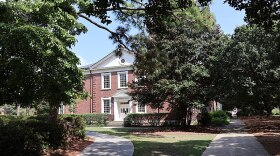State lawmakers in Raleigh held a meeting Tuesday to discuss moving funding from some non-profit groups to the state Department of Commerce. The joint oversight commission included an update on the shrinking of the state’s Rural Economic Development Center, a formerly powerful organization that provided grants to rural areas. Most of the center’s assets are in the process of shifting to the Department of Commerce.
State Budget Director Art Pope appeared before lawmakers this morning to explain what’s next for the Rural Center. Since July, most of the center’s assets, worth millions of dollars, have been frozen. Legislators defunded the rural center in this year’s budget. Pope says plans to move most of the center’s grant-making operations to the Department of Commerce are moving ahead.
"Mr. Speaker, members of the House, the state budget office has submitted a letter updating the governmental operations on the disbursement of funds from the rural center since the funds were quote frozen," said Pope.
It’s part of a larger effort by the administration to take control away from several economic development non-profits that receive money from the state. A new public-private economic partnership under the Commerce Department will now take charge of divvying out grants to rural areas. But Pope says the Rural Center will retain some control over a few remaining projects- for now:
"It is the intention of the McCrory administration not to totally disrupt the Rural Center’s programs especially clean water infrastructure programs by asking that all money be returned to the general fund."
But 85 million dollars worth of existing grants will be shifted over to the Department of Commerce. 24 million dollars in assets will revert to the state’s General Fund. The decision to transfer those funds, made earlier this year, will strip the center of its power. A state audit in June revealed that the center’s director was earning 214 thousand dollars a year and that the center has earned 20 million dollars in interest from state funds over the years. The director stepped down, but lawmakers still wanted the interest money to be returned, and now it will be.
But there’s some confusion about which programs will remain under the rural center’s purview for now and which will revert to Commerce. Democrat Martin Nesbitt is the Senate Minority Leader.
"The problem I’m having with this is every time we talk about it we’re mixing apples and oranges and peaches and pears," said Nesbitt. "I mean like the clean water trust fund and these kinds of things thrown in. I’m trying to figure out what the Rural Center was doing and who’s doing that function now and how much money."
For its part, the administration is still trying to figure out how best to transfer money back to the state from the non-profit Rural Center. Officials agree they’re venturing into a legal grey area. A number of lawmakers from both parties have expressed the concern that the new public-private partnership, headquartered in Raleigh, won’t have the same feel for rural issues.
And some legislators fear the new partnership will have its own set of problems.
"We were looking at how the transfer goes from a couple of non-profit groups that the state shut down because they were concerned about transparency and accountability," said Democratic senator Josh Stein, who represents Wake County.
"At precisely the same time Gov. McCrory is announcing the formation of a new mega-non-profit organization that’s supposed to take over for the Department of Commerce," said Stein. "It just doesn’t make any sense to me. Why would we go about and do something that might result in the same or greater problems than what we perceived at the Rural Center?"
Some public-private partnerships in other states with Republican governors have had problems- including mixing public and private funds and failing to track loans that were past due. But state officials here in North Carolina say this new partnership will allow them to provide a more coordinated, centralized approach to getting the state’s economy back on track.






